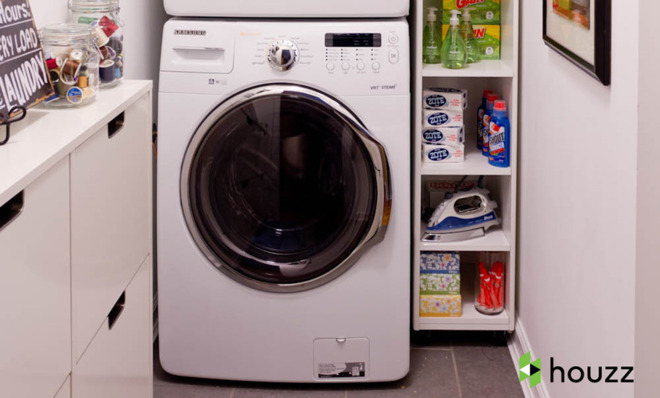How to survive a power outage
Plan ahead!

A free daily email with the biggest news stories of the day – and the best features from TheWeek.com
You are now subscribed
Your newsletter sign-up was successful

You probably know the ominous feeling: As a storm or hurricane sweeps through your community, you're huddled safe at home or in a nearby shelter … and without warning, the lights all flicker and die. You've lost power, and experience says it could be a while before you get it back. What do you do now?
If you're one of the lucky folks who has a generator, the going won't be so bad, and you can live in relative comfort until the power's back on. But generators can be expensive, beyond the reach of many of us. If a storm is coming and you could be facing days or even weeks without electricity, these steps can help you make it through.
(More from Houzz: 7 ways to charge up and connect after a disaster)
The Week
Escape your echo chamber. Get the facts behind the news, plus analysis from multiple perspectives.

Sign up for The Week's Free Newsletters
From our morning news briefing to a weekly Good News Newsletter, get the best of The Week delivered directly to your inbox.
From our morning news briefing to a weekly Good News Newsletter, get the best of The Week delivered directly to your inbox.
Plan early. When a big storm is bearing down, there'll be a run on water, propane, portable lanterns and other essentials at local stores. Keep as many of these items as possible on standby so that you don't get caught in the crush or, worse, face a shortage.
Stock the pantry. Have on hand nonperishable goods that offer plenty of protein and other nutrients and can be eaten cold: peanut butter, whole-grain crackers, energy bars, beef jerky, dried and canned fruit and so on. Make sure you have food, litter, and other supplies on hand for pets as well.
Don't forget to keep a manual can opener nearby. And stockpile plenty of bottled water or water in jugs for drinking.
Make or buy extra ice. When you know there's a storm headed your way, load up on bagged ice from the supermarket or fill zip-top plastic bags with water and freeze them to create cold packs. Use them in the fridge, the freezer and coolers to keep milk, meat and other perishables at a safe temperature as long as you can.
A free daily email with the biggest news stories of the day – and the best features from TheWeek.com
Get prescriptions filled. If you're running low on medication and the power is out at your local pharmacy, you could be in a bind. Get your next refill and keep it handy.
Get your grill ready. If you can't use your stove, you'll want an alternate way to cook. For gas grills, have extra propane tanks on hand; if the grill is connected to a natural gas line that may be affected by the storm, it's worth buying or borrowing a charcoal model. Lay in a supply of charcoal, in watertight containers to keep it dry if necessary.
(More from Houzz: Find creative ways to organize your kitchen pantry)
Remember to grill outdoors only; don't be tempted to bring the grill inside, no matter how cold or wet the weather is. In a pinch you can channel your scout days and fashion a makeshift oven. Use the oven outside, away from any flammable surfaces, and extinguish the coals promptly after cooking.
Know where your lanterns and flashlights are. It's a good idea to keep at least one or two in an easy-to-reach spot on every floor of the house. Consider flashlights that are powered by winding or another nonbattery method.
Charge your phone and other electronic gadgets in advance. Then use them as sparingly as possible; power them down or off when you don't need them. If you have car chargers, you can top off the charge periodically when necessary. And while we're talking about cars, fill your gas tank well before the storm hits.
Get laundry done. Your washer and dryer won't work while the electricity is out. Wash as many loads as you can before the storm so you won't run out of clean clothes while the power crews do their thing.
If necessary, have a portable heating or cooling source. In hot climates or in the middle of summer, you may not have air conditioning; in winter, you could be without heat for a while. Buy a few inexpensive battery-operated fans (and plenty of extra batteries) and/or propane heaters. If you have a wood-burning fireplace, be sure there's plenty of firewood to fill it.
With propane heaters, safety is key — they're not designed for small or poorly ventilated spaces. Use them in your largest room and don't run them continuously; use them only to keep the room warm enough to avoid compromising your health. Stay bundled up in sweaters, hats, gloves, extra socks, and blankets.
(More from Houzz: How to pick the right generator)
Also, know when to cut and run. If you're not able to keep the house cool or warm enough for all family members to stay safe, go to a nearby hotel or shelter, or travel to a friend or family member's home in an area not affected by the storm.
Conserve water. Fun fact: A typical family of four goes through almost 300 gallons of water a day, much of it hot. A gas water heater may work even when the power's out. An electric one obviously won't. Use hot water sparingly to make it last as long as you can, but without a heat source, it will begin to cool fairly soon. If you have to, you also could heat water on the grill or over the fire.
With well water, you'll lose pressure if the pump switch won't work. If you don't have a supplemental storage tank built into your system or a portable generator that powers the pump, fill big tubs or your bathtub with water that you can dip into for flushing toilets or sponging off. Never drink well water during or after a power outage until you're certain it's not contaminated.
If you have a generator, offer to help. Do what you can to make life easier for others in your community. Let neighbors charge phones or take a warm shower, or prepare hot food to deliver to elderly residents or families with young kids. Should you have internet access, you can even use the power of social media to spread the word about people in your area who may be in need of immediate assistance.
Houzz helps you renovate and design your home from start to finish, whether you're decorating a small room or building a custom home and everything in between. Get started!
-
 Democrats push for ICE accountability
Democrats push for ICE accountabilityFeature U.S. citizens shot and violently detained by immigration agents testify at Capitol Hill hearing
-
 The price of sporting glory
The price of sporting gloryFeature The Milan-Cortina Winter Olympics kicked off this week. Will Italy regret playing host?
-
 Fulton County: A dress rehearsal for election theft?
Fulton County: A dress rehearsal for election theft?Feature Director of National Intelligence Tulsi Gabbard is Trump's de facto ‘voter fraud’ czar